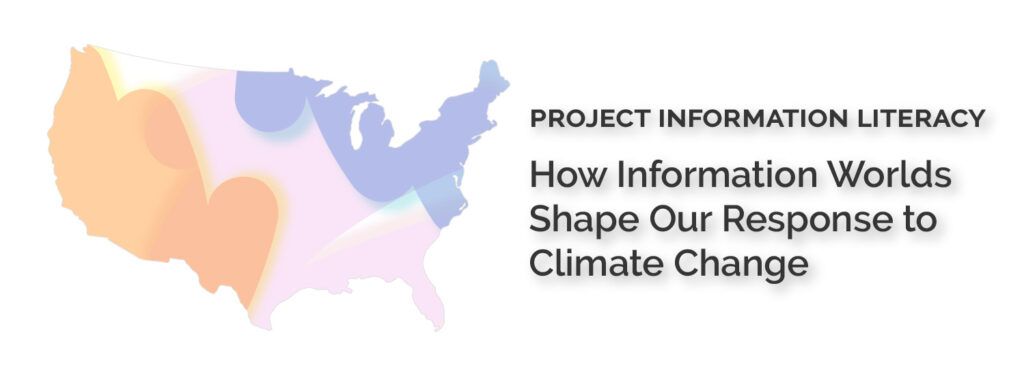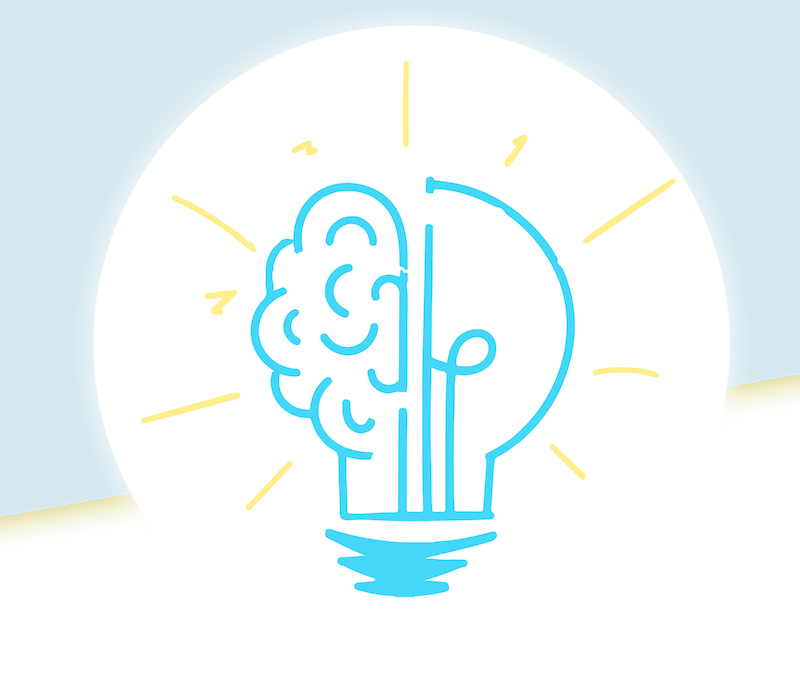
Project Information Literacy (PIL) is a nonprofit research institute that conducts national, ongoing studies on how adults find and use information as they progress through, and beyond, their higher education years and throughout adulthood. We work in small teams on large-scale studies using a collaborative social science research approach, mixed methods, and samples from across the United States.
PIL began in 2008 by studying college students’ research experiences in the United States. Over 14 years of the “College Study,” we surveyed and interviewed nearly 22,500 U.S. college students and released 12 groundbreaking reports that examined how they interact with information resources for school, for life, for work, and most recently, for engaging with the news.
What’s new? How do people’s information worlds shape their response to climate change? We have a new national study for 2023/2024 using an information literacy lens to examine climate change awareness, attitudes, and advocacy in a divided America. During fall 2023, we surveyed 4,500 members of the general public (ages 16-85), and in early 2024, we surveyed another 1,600 U.S. college students. Here’s a FAQ.

> Read our latest Smart Talk interview: News is an overwhelming hodgepodge of headlines, posts, alerts, tweets,
visuals, and conversations that stream at them throughout the day. But still some of us choose to tune out: Who are “news avoiders” and why have they chosen to practice news abstinence? Read our interview with Benjamin Toff, who has co-authored, Avoiding the News: Reluctant Audiences for Journalism, based on extensive survey data and interviews he and his colleagues did about news avoidance in three countries, including the U.S.
> Host a PIL Virtual Chat this year. It’s a unique way to build engaging discussions at your institution and share ideas about improving teaching and learning while suggesting new avenues for inquiry and experimentation. We have five lively chats available through April 30, 2024 with PIL researchers Alison Head, Barbara Fister, Steven Geofrey, and Kirsten Hostetler, covering everything from AI for the classroom, algorithmic bias, students’ search habits, and re-designing one-shots. Sign up here.
> Read PIL’s latest opinion piece, “Getting a grip on ChatGPT,” by Barbara Fister and Alison Head, published by Inside Higher Ed (IHE). “Considering what academia got wrong about Wikipedia helps to crystallize the questions we should be asking about ChatGPT and our knowledge environments,” as AI debuts a new app “geared toward customer satisfaction rather than facts” (May 4, 2023). Selected by IHE editors as one of their most-read opinion pieces of 2023.
Recent Research Publications
“The Project Information Literacy Retrospective: Insights from more than a decade of information literacy research, 2008-2022”: A summary of the entire body of “The College Study” research, which sunsetted in 2022. Major findings from 12 reports and seven related research articles are presented. A computational analysis of 2,475 citations from 1,961 sources provides empirical data for interactive information visualizations about the geographic reach and impact of PIL’s research on the wider educational context.
“Covid-19: The First 100 days of U.S. News Coverage”: PIL’s two-part series examines the shape and flow of the coronavirus story across time and digital spaces, and its visual representation, based on a large sample of stories from widely read U.S. news websites. The series, released in September 2020, includes discussion prompts and activity-based exercises for improving news and visual literacy that are suitable for virtual or in-person learning.
“Information Literacy in the Age of Algorithms”: In this January 2020 report from a yearlong study, we report on students and their awareness and concerns about algorithmic-driven platforms that shape and influence news and information they receive. Authors: Alison J. Head, Barbara Fister, and Margy MacMillan, with research supported by the John S. and James L. Knight Foundation, Harvard Graduate School of Education, ER&L, a leading library conference, and the School of Library and Information Science at the University of South Carolina. Winner of ACRL’s Ilene F. Rockman Instruction Publication of the Year Award, 2021.
“Across the Great Divide: How Today’s College Students Engage with News”: This lead article from the PIL Team in the August 2019 First Monday issue asks: How can college students and young voters be prepared with the information skills they need to assess news quality and credibility of the information found online and in print as the threats of “fake news,” propaganda, and bias multiply and intensify? Opportunities and strategies are identified for preparing students to gather and evaluate credible news sources, first as students and then as lifelong learners. Authors: Alison J. Head, Erica DeFrain, Barbara Fister, and Margy MacMillan.
“How Students Engage with News”: In this October 2018 report from a yearlong study, we report on students and their news engagement practices. Authors: Alison J. Head, John Wihbey, Takis Metaxas, Margy MacMillan and Dan Cohen, with research supported by the John S. and James L. Knight Foundation, the Association of College and Research Libraries, and Harvard Graduate School of Education.
The Provocation Series

The PIL Provocation Series builds on a solid decade of PIL’s original research into students’ information practices in the digital age, our 2021 occasional Series offers new insights, drawing from scholarship and the flow of current events and explores what “literacy” means today in all of its manifestations.
February 16, 2022: Barbara Fister, “Principled Uncertainty: Why Learning to Ask Good Questions Matters More than Finding Answers,” exposes the limitations of college research assignments that constrain curiosity and reward a binary approach to assembling evidence. In a world where search technologies compete to provide the single, simple, and quickest answer, Fister asks how can we work on asking better, bigger, and more difficult questions with our students and ourselves? How can we address students’ anxieties and insecurities as we connect this scaffolding for inquiry not just for college, but in the world? Read the Author’s Note on what inspired this essay. Discussion group questions are here.
December 14, 2021: Mike Caulfield, “Information Literacy for Mortals,” claims that the teachers and librarians “have to understand that in the context of decision-making, simple can be good, less can be more, and the skills our students bring into the classroom may be a more valuable starting point than anything the traditional research process can provide. Author’s note: Why I wrote this essay. Discussion group questions are here.
August 11, 2021: Nicole A. Cooke, “Tell Me Sweet Little Lies: Racism as a Form of Persistent Malinformation,” asks “How can these deleterious and destructive forces of racist and racialized malinformation be eliminated? They need to be addressed and battled just as other societal ailments are, and critical cultural literacy can aid in this fight.” Author’s note: Why I wrote this essay. Discussion group questions are here.
June 9, 2021: Kirsten Hostetler, “The iSchool Equation,” asks “Are iSchools producing graduates who possess the teaching skills to tackle the growing problem of the spread of misinformation?” Author’s note: Why I wrote this essay. Discussion group questions are here. For the transcript and slides of the discussion between Dr. Hostetler and the University of Arizona’s Nicole Pagowsky on October 29th, visit “Learning to Teach in MLIS Programs: Research, Experiences, & Ways Forward.”
April 7, 2021: Alison Head, “Reading in the Age of Distrust,” asks “Are educators equipping college students with the critical reading skills they need for today?” Author’s note: Why I wrote this essay. Discussion group questions are here. Read PIL’s interview with Jenae Cohen on deep reading.
Feb. 3, 2021: Barbara Fister, “Lizard People in the Library,” asks “How have conspiracy theorists managed to seize the banner of ‘research it yourself’ from the classroom?” Author’s note: Why I wrote this essay. Discussion group questions are here. Swedish translation now available.

